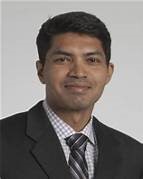
New Investigator, REC
Jagan A. Pillai, MD, PhD
Assistant Professor, Neurology
Cleveland Clinic Lerner College of Medicine, Case Western Reserve University
Neurologist, Cleveland Clinic
Research Education Component
Can you please tell me about your role in the CADRC?
I am a cognitive neurologist at the Center for Brain Health, which means I primarily see patients with cognitive problems and try to understand why they have them, whether it is from medical conditions or neurological changes. I also conduct translational research, trying to see how best to care for these patients going forward. Combining these roles, I have two complimentary positions in the ADRC. I am a clinician at the clinical core which means we do evaluations of people coming into the ADRC, as well as a scholar in the Research Education Committee (REC), where the goal is to develop research skills for the next generation of researchers in Alzheimer’s Disease (AD).
Can you please tell me what key questions your research is intended to answer?
My clinical research is driven by impressions I have gathered of the patients I see. One of the key questions I deal with as a clinician is why everyone with a diagnosis of Alzheimer’s does not behave the same way. Some people have a very fast progression of the disease, within a year or two of onset, however other people have a very slow progression, where changes happen over 12-15 years. My primary focus of the last five years has been understanding why this happens and if the immune system is one factor driving this difference in progression. My second focus deals with the different phenotypes and characteristics of patients with the disease. Some people with AD present primarily with memory problems, which is commonly known. But other times people with AD can also present with language problems, difficulty seeing things clearly, spatial problems, or behavioral issues. These specific skills involve different parts of the brain, so the question is why are some people more prone to memory problems over other conditions. Presumably they all have the same underlying AD pathology with amyloid and tau protein accumulation in the brain, so why is there so much variation among our patients? The latter project is being pursued through the ADRC in trying to understand if there are differences in the pathological protein expressed in these patients with different clinical presentations and understanding their genetic characteristics.
How did you get interested in dementia research?
My drive had been in trying to understand why people are different in the way they think and what they understand. That question has morphed into trying to understand how people with the same kind of brain pathology can be very different in their presentation and how can you best help them. The bottom line is I feel people are very unique in their capabilities, so neurodegenerative diseases affect them in a very specific way. Understanding what is so special about each person can allow us to help them in the best way possible rather than having a generic solution.
What do you think has been most helpful to your career so far?
Most helpful to my career was the advice I received from one of my mentors when I was just starting my research over twelve years ago. It is important to pick an area of interest that you can use all of your skill sets and really grow from. I trained primarily in neurophysiology and clinic neurology, but now my work is mostly in proteomics and genomics and that came through from following my research questions and from such advice.
Specific to the ADRC, what do you think has been helpful to your research?
Having the ADRC in Cleveland focuses the energy of a large group of talented clinicians and researchers and allows us to cooperate much more effectively than we would have done by ourselves.
What does the future of dementia research look like to you?
I think we will have a clearer way of treating and improving the quality of life in patients before they develop dementia. I also believe there will be a lot of focus on developing a very targeted treatment plan for each person.
Is there anything you would like to add at this point?
One of the things that I’ve seen in the field of neurodegenerative diseases is there is a lot of energy and excitement surrounding it. Often, the public feels there have been a lot of failures with therapies for Alzheimer’s, but as researchers trying to understand the disease, our understanding has grown by leaps and bounds. I feel like this has been a very positive development in the field.
